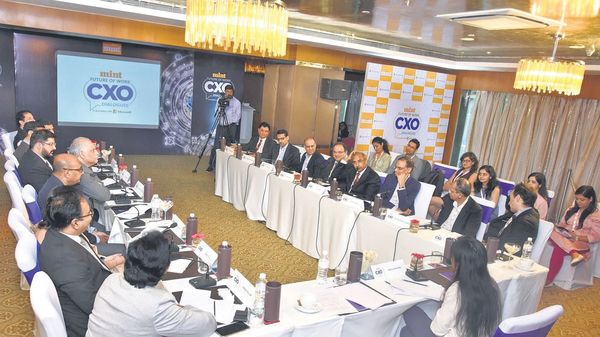Technology is an enabler that makes data available at a single touch and helps in cost optimization, collaborations and governance, experts said at a closed-door roundtable meeting. At the event titled Microsoft Future of Work—CXO Dialogues, hosted by Mint in Mumbai last month, they also sought to dispel perceptions that digitization and automation were responsible for the loss of jobs.
Experts said a lot of help from financial services will be needed to achieve the $5-trillion target for the Indian economy by 2025. However, the biggest challenge for technology remains in maintaining data security and to avoid a breach of privacy, said the CXOs.
At the event, moderated by Shrija Agrawal, associate editor, Mint, speakers admonished the “unnecessary hysteria” being created about job loss due to technology, and urged the youth to pick up various skills and not lose the art of making informed decisions.
Rekha Talluri, chief financial officer (CFO), Microsoft India, said that cybersecurity breach was an organized crime, wherein hackers are intentionally going after large and small organizations, and even targeting individuals. She said every organization, on an average, has 35-70 different security products and the fast pace of technological challenges has led to a demand for qualified professionals. “Globally, there is a shortage of 3 million cybersecurity jobs and there is a lack of talent in this space,” she added.
Yogi Sriram, senior vice-president, Larsen and Toubro, said: “We are moving from learning management systems to learning management platforms. The term work-life balance is losing its sheen with a very thin line between work and leisure. Leaders keep talking about digitization and automation, and how it will impact jobs. Unnecessary hysteria about jobs being lost is being created,” he said.
Talking about opportunities, Saugata Bhattacharya, senior vice-president, Axis Bank, said technology is an enabler and, in the BFSI space, the quality of entrepreneurs has always been very high. “Tech is so pervasive. One of the characteristics in India is that we may not be large scale innovators, but we are rapid adaptors of technology. We can copy, design and adapt, and that will hold us in good stead.”
Bhattacharya said technology has contributed to the cost of acquisition in incredible ways and the greatest example is the government’s Jan Dhan Yojana. “Forget about your existence if you’re not agile in your learning…85% of rural adults have a Cibil score. It is absolutely stunning. The ability to finance people that now exists in the system is exponentially different from what was 3-4 years back.”
Upma Goel, CFO, Ujjivan Small Finance Bank, said though the bank primarily caters to the underserved and un-served sections of the society, they have also been “easy adopters” of technology.
Sameer Kamath, group CFO, Avendus Capital Pvt. Ltd, said that in financial services, data is most important. “In 2009, PAN card was not even compulsory. Digital helps you to do mass customization. We have always done mass standardization, I am looking at mass customization and, data to my mind, is the biggest source to achieve that.” Elaborating further on technology and the challenges in the financial services space, Ashutosh Khajuria, executive director and CFO, Federal Bank, said the biggest threat was data security and breach of privacy.
Akshay Amar Garkel, partner, Grant Thornton India Llp, said the typical challenges banks face is fear of reputation loss. “Also, banks want to make use of technology in process improvement, cost-optimisation, time to market, collaboration and governance.”
Nayan Mehta, CFO, BSE, said for any establishment across the globe, new threats emerge every day and, in a stock exchange, threats are not only cyber in nature, but even manipulation of stock prices.
Javier Lopez Ullod, Microsoft CFO-Asia Pacific, concluded that the fundamental issues plaguing economies are similar across markets and, therefore, the conversations and challenges were very similar.
“In particular about India, there are a few things common, such as talent and its scarcity. Skilling and learning is fundamental. We have a defined curriculum we have to go after. There are all platforms for learning,” he said, adding that there were a lot of inventions happening in Asia and the future belongs here rather than a developed economy like the US.
















